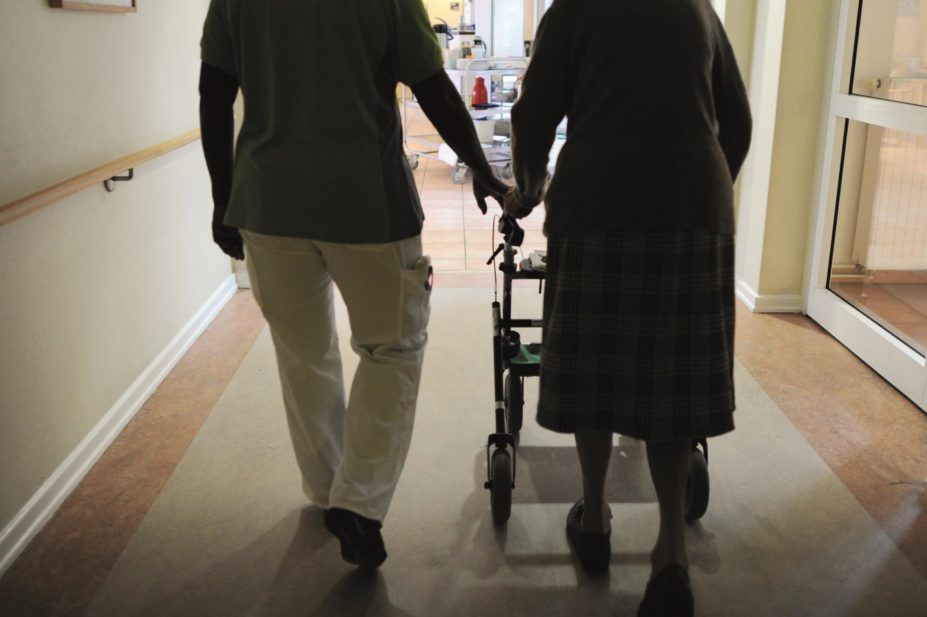
dpa picture alliance / Alamy Stock Photo
Pharmacists should have overall responsibility for medicines and their use in care homes across Great Britain, says the Royal Pharmaceutical Society (RPS) in a report released on 23 February 2016. The report, entitled ‘The Right Medicine: Improving Care in Care Homes’ concludes that embedding pharmacists into care homes as part of the multidisciplinary team could improve care, cut NHS medicines waste, reduce medicine-related errors and, consequently, save the NHS £135m a year.

Source: MAG / The Pharmaceutical Journal
Chair of the RPS English Pharmacy Board Sandra Gidley says “now is the time for the NHS to act and improve the care of residents by ensuring a pharmacist has responsibility for the whole system of medicines and their use within a care home”
Sandra Gidley, chair of the RPS English Pharmacy Board, says pharmacists can provide the solution to many medicine-related problems experienced in care homes in Great Britain. “Care home residents take an average of seven medicines a day. Without a regular review of what’s still needed, this cocktail of drugs can cause poor health, a lower quality of life and costly unnecessary admissions to hospital,” she says. “The evidence is clear: now is the time for the NHS to act and improve the care of residents by ensuring a pharmacist has responsibility for the whole system of medicines and their use within a care home.”
The potential £135m saving highlighted in the RPS report was calculated following a review of three pilot studies examining the impact of having a pharmacist in a care home setting, and enabling pharmacist-led interventions and frequent medicine reviews. The pilots showed that, in terms of medicines optimisation, there was an average saving of £153 per resident. It also showed that if a named pharmacist policy was implemented across Great Britain, up to £60m could be saved through improved medicines use and over £75m saved through avoiding unplanned hospital admissions. The report therefore recommends that local commissioners, such as clinical commissioning groups (CCGs), should commission pharmacists to provide a regular programme of medicine reviews within local care homes.
As well as saving money, the RPS emphasises that giving pharmacists overall responsibility for medicines in a care home could reduce the number of medicine-related errors. During a four month trial in a London care home in which a pharmacist was given full responsibility for medicines management, there was a 91% reduction in errors associated with medicines, says the report.
The report also states that pharmacist-led medicine reviews can lead to a reduction in the number of medicine-related falls in elderly patients and a reduction in the number of psychotropic drugs being prescribed inappropriately. It also recommends that advice about and access to end-of-life and anticipatory medicines should be a formalised process between prescribers, pharmacists and care home providers.
The RPS report highlights the importance of pharmacists having full read and write access to the patient record “in the interest of high quality, safe and effective patient care”, explaining that poor communication between healthcare professionals can lead to prescribing errors and a negative effect on the health of care home residents.
“At a time when community pharmacy is facing unprecedented pressure through a £170m cut to its funding, the RPS is seeking ways forward by proposing new ideas about how pharmacists from all sectors can be better integrated across NHS services,” says Gidley.
The RPS report was written with the help of families of care home residents, care home providers, local authorities, care professionals and expert pharmacists and includes a summary of the views of participants at a care home summit held by the RPS on 10 December 2015. In terms of their medicines, participants thought the most important factors for residents were effectiveness, involvement in decisions made about their medicines, medicines optimisation built on individual need, personalised care, safety and support. However, some summit attendees said that more training would be needed for pharmacists to take on this new role in care homes along with professional support, mentorship networks and improved IT systems.
Maureen Baker, chair of the Royal College of GPs, says: “With GPs and our teams under incredible resource and workforce pressures, the suggestion that pharmacists to take on some of the medicine management responsibilities in care homes is definitely worth exploring.”
On 24 February 2016, the RPS is holding a joint event with the King’s Fund that will explore the crucial role of pharmacy in supporting the primary and secondary care of vulnerable patients in care homes and other healthcare settings.

